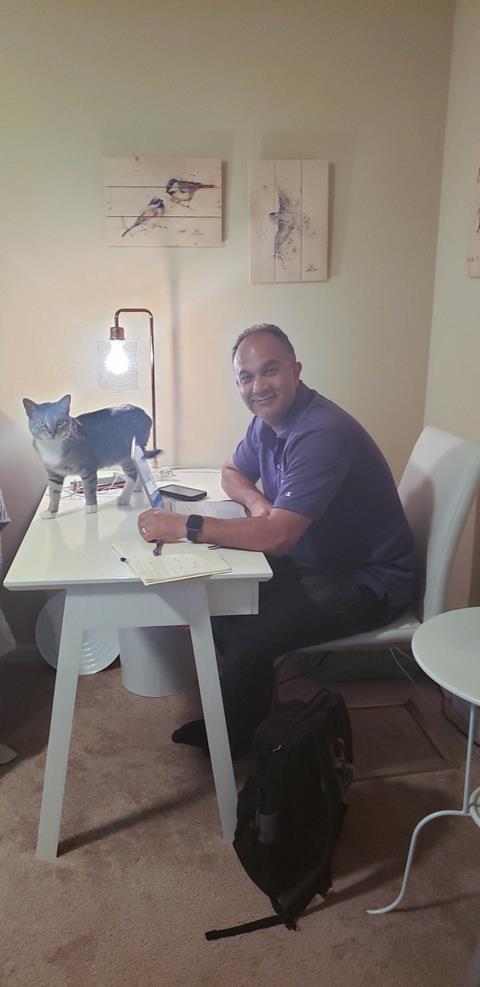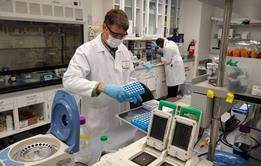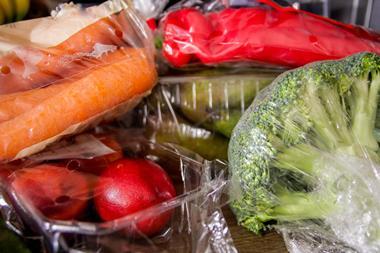An MOF pioneer has just reopened his lab at Northwestern University after more than two months, with new social distancing precautions
During this difficult time, Chemistry World is checking in with chemists around the globe to see how they are weathering the Covid-19 pandemic.

Omar Farha, an associate chemistry professor at Northwestern University in Illinois, United States, is a pioneer in designing, synthesising and commercialising molecule-based porous materials, including metal-organic frameworks (MOFs). His lab, which has 32 researchers, reopened in a limited capacity on 1 June after being largely shut down for over two months.
The pandemic prompted classes at Northwestern to go online in mid-March, and university labs were closed about a week later, except for a small amount of work considered ‘essential’, like projects focused on the novel coronavirus.
It wasn’t too difficult to mothball Farha’s lab, with the exception of a couple of glove boxes. ‘Everything else we could turn off easily and safely, but the glove boxes have to be maintained at a certain pressure,’ he explains. A few team members were designated ‘essential employees’ so they could check up on things every few days to make sure that water or oxygen was not leaking into the glove boxes, and that the argon gas tanks were not losing pressure.
Now that Northwestern is in the second phase of a six-step reopening process, research has resumed at low capacity. Lab workers are required to be six feet apart, so Farha has created two shifts – one from 8am–2pm, and another from 2:30–8:30pm. ‘Everyone is basically back, just fewer people at a time, and your shift is shorter – you have to think about what can be done in six hours,’ says Farha, who is originally from the West Bank in Palestine.
Not at full capacity
He acknowledges that experiments are not at full capacity. ‘Sometimes you wish you could run things that need to be monitored for 13 or 14 hours,’ Farha says. ‘We have to do the chemistry that is allowed within the time allocation.’
He chose shorter daily shifts, instead of longer ones with one day on and one day off, because he didn’t want people congregating in hallways or offices. ‘I believe the lab is the safest place – people are far away from each other, you have the hoods with the right ventilation,’ he says.
Masks are required inside Northwestern buildings, but not in wet labs by fume hoods. ‘If you are sitting far away from any reaction or by an instrument that doesn’t do much and you want to wear a mask I don’t think that is an issue, but if you are by your hood running reactions it is not recommended,’ Farha says.
Prior to 1 June when phase two began, a few members of his team were already back in the lab pursuing work to fight Covid-19. The project is funded by a US National Science Foundation (NSF) grant awarded in early May to mobilise research on the novel coronavirus.
Farha’s lab focuses on MOFs for energy, environment and defence-related uses, and one application being pursued is a material that can capture and destroy nerve agents. ‘In the last couple of years, we adapted or combined those nanomaterials into textiles and fabrics for things like soldier uniforms,’ Farha explains. ‘We decided to take what we had learned and put that towards making antiviral masks.’ With the NSF funding, his researchers are working to develop MOFs that can deactivate viruses like Covid-19 upon contact.
Sticking with Zoom for now
Farha himself is now back in the office about three times a week. ‘Do I need to be there all the time, no, but sometimes being there to make sure that things are running smoothly is important,’ he says. Farha is continuing to run his group meetings remotely via Zoom. ‘Just because we are back at lower capacity doesn’t mean that I meet with my students in person,’ he says.
‘If I am on campus and somebody wants to talk to me, and they are six, seven or eight feet away from me, sure I will chat with them for a couple of minutes, but we are not talking for 30 minutes about our research in person,’ Farha continues. ‘Everything is done online by Zoom, and I think that will continue for a while, until we are comfortable having multiple people in a room together.’
Outside of the lab, Farha says he and his wife have learned a lot from their children, aged 11 and 13, who adapted well to the new post-Covid restrictions. Their online-only school is over for the summer and camps are cancelled, yet they are resilient and somehow maintain positive outlooks.
Farha estimates that he was on work travel about 50% of the time pre-Covid, and he says it’s been ‘just awesome’ being at home the last few months. ‘We are at phase two at Northwestern and we still cannot travel, which means I am still with my family,’ he says. ‘I am enjoying it until we go back to reality.’
Farha hopes the pandemic will positively affect chemists and all scientists by demonstrating the benefit of better planning, hygiene practices and social responsibility, among other things. ‘It also maybe showed us that there are more efficient ways of doing business,’ he adds. ‘We should not just go back to the way we were when we shut down, but be more effective and more efficient.’
Chemists amid coronavirus

How chemists around the world are coping with life and work during the Covid-19 pandemic
- 1
- 2
- 3
- 4
- 5
- 6
- 7
- 8
- 9
- 10
- 11
- 12
- 13
- 14
- 15
- 16
- 17
- 18
- 19
- 20
- 21
- 22
- 23
- 24
- 25
- 26
- 27
- 28
 Currently
reading
Currently
reading
Chemists amid coronavirus: Omar Farha
- 30
- 31
- 32
- 33
- 34
- 35
- 36
- 37
- 38
- 39
- 40



























































































No comments yet